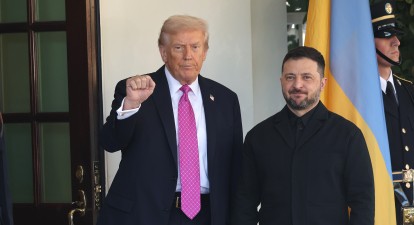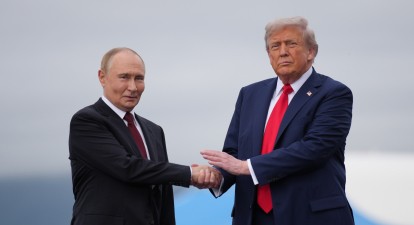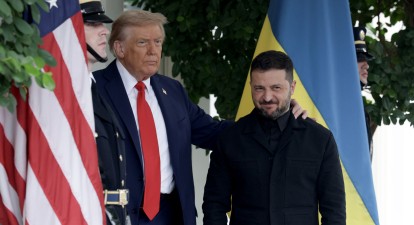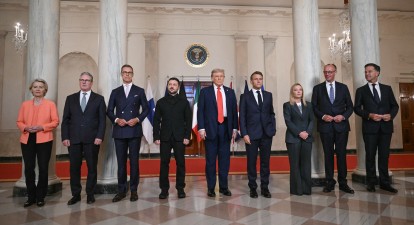
Europe is strengthening Ukraine's position ahead of Trump-Putin talks, so it is convening a coalition of the willing in Brussels on October 23. Photo by Getty Images
Ahead of the Putin-Trump meeting in Budapest, EU leaders are trying to strengthen Ukraine's position by preparing new financial and military aid packages and expanding sanctions against Russia. How will the coalition of the willing support Ukraine and what is stopping them? Highlights from the Politico article
Buy an annual subscription to six Forbes Ukraine magazines for the price of four issues. If you value the quality, depth, and power of real-world experience, this subscription is for you.
Russian President Vladimir Putin and US President Donald Trump are preparing to meet in Budapest, and Europe is responding with an urgent consensus. After the failed visit of Ukrainian President Volodymyr Zelensky to the White House on October 17, European leaders are rushing to strengthen Kyiv's position, fearing that the Trump-Putin meeting could result in an agreement to “freeze” the conflict on terms that are unfavorable to Ukraine.
Europe is making Putin “pay” for aggression
The European strategy is based on three key steps: more funding and weapons for Ukraine and a decision to hit the Russian economy by imposing new sanctions, diplomats and officials tell Politico.

Popular Category Money Date October 17 Half as much funding and focus on de-shadowing . Ukraine and the IMF discussed key parameters of the future program. What do they look like?
European leaders are convening a coalition of the willing to coordinate additional aid. British Prime Minister Keir Starmer is announcing an emergency meeting to “paralyze Putin’s war machine” and ensure Ukraine is as strong as possible before, during and after any ceasefire. Zelensky is expected to speak at a summit in Brussels, either in person or by video link, to rally support.
The conversation between Putin and Trump carries the risk that the “freeze” agreement will lead to the transfer of part of Ukrainian territories. The shadow of this risk strengthens the role of Hungarian Prime Minister Viktor Orban. He has repeatedly blocked sanctions against the aggressor country and maintains contacts with Russia.
European leaders fear that Trump could once again support Putin’s position and pressure Zelensky into agreeing to the Kremlin’s terms – even if it means handing over part of Ukraine’s eastern territories to Russia. “Russia understands only force,” says Kaia Kallas, rejecting the option of a peace deal with the preservation of the occupied territories.
Brussels does not believe in the sincerity of Putin's intentions, writes Politico. Many diplomats are convinced that his offer of a new meeting with Trump is just an attempt to stall for time while Russia continues missile and drone attacks on Ukraine.
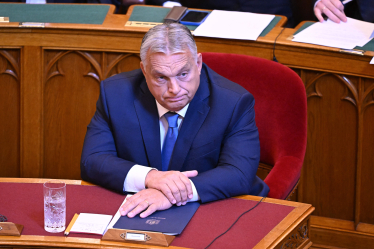
Hungarian Prime Minister Viktor Orban has repeatedly blocked European sanctions against Russia. Photo Getty Images
Russian assets and compromises
One of the main issues at the EU summit will be a plan to use €140 billion in frozen Russian assets to create a reparations loan for Ukraine. The idea is to direct the profits from these funds to finance Ukrainian needs, and the return of the assets to Russia is possible only if it agrees to compensate for war losses. Most of these assets are stored in Belgium, where there are fears that their seizure could damage the reputation of the financial system.
Several EU countries have expressed concern that the move could undermine confidence in the euro unless it is supported by the United States, Japan and other partners. On Thursday, October 23, European leaders are due to decide whether to formally instruct the European Commission to prepare the legal framework for launching the “reparations loan.” Belgian Prime Minister Bart de Wever is expected to agree to the start of work, reserving the right to block the document later, Politico adds.
Diplomats believe the move will increase pressure on Putin and give Ukraine a guarantee of financial support for the next two to three years. The EU is also preparing to adopt a 19th package of sanctions against banks and crypto services that help Russia circumvent sanctions restrictions.
Slovakia has so far held back on the decision, fearing a reduction in Russian gas supplies to the country, but diplomats say a compromise with Prime Minister Robert Fico has almost been reached.
Materials on the topic

Category World Date Yesterday “Disappointment, but not a catastrophe.” Three negative and two positive consequences for Ukraine from another surge of Trump diplomacy

Category World Date October 17 “Another Almost Pointless Meeting.” What Could Trump and Putin Be Negotiating in Budapest? Analysis by Bloomberg, FT and WSJ

Category World Date October 17 “Trump wants to change the status quo.” While all eyes are on the Tomahawks, Trump’s track with China may be key for Ukraine. Forbes Ukraine Analysis

Category War Date October 04 Peace deal unlikely. Ukraine-Russia war enters new phase after Trump diplomacy fails. What are four possible scenarios? Key takeaways from CSIS analysis

Category World Date September 25 The US is (not) withdrawing from the peace process. How do diplomats in Kyiv and Europe interpret Donald Trump's new statements regarding the war in Ukraine? Analysis Forbes Ukraine

Category World Date September 24 “Time for Ukraine to Act.” Trump has changed his rhetoric regarding the war in Ukraine. Why is such a U-turn dangerous? Analysis by NYT and Reuters
